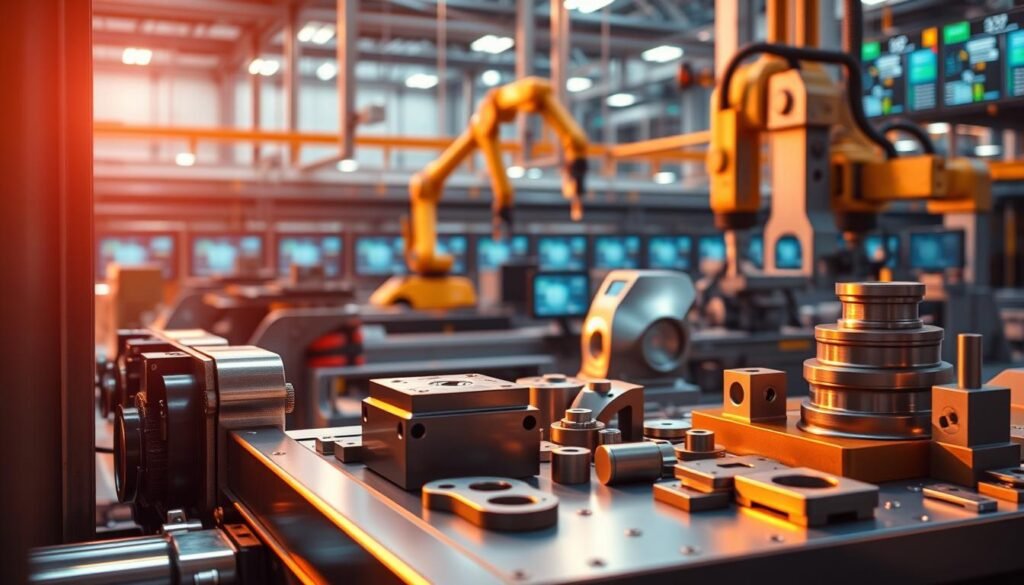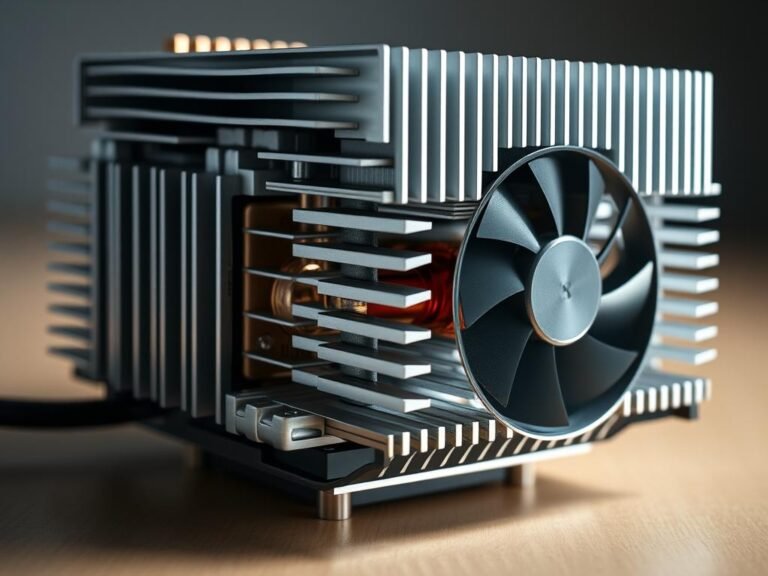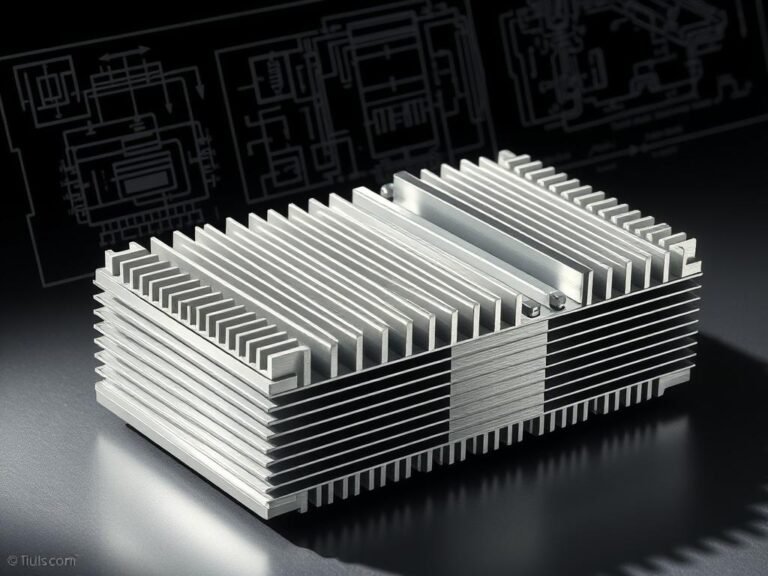CNC technology has fundamentally changed modern computer-controlled manufacturing. CNC stands for "Computer Numerical Control" and refers to a highly precise manufacturing process in which machines process workpieces accurately through computer-controlled instructions.
In industrial production, CNC machines enable unprecedented accuracy and efficiency. This innovative technology uses digital control systems to automate and optimize complex machining processes.
Modern CNC machines can process various materials such as metal, wood, and plastic with the highest precision. They have revolutionized the manufacturing industry by replacing manual processes and significantly improving production quality.
Key findings
- CNC means Computer Numerical Control
- Enables high-precision computer-controlled manufacturing
- Automated complex processing procedures
- Usable in various materials
- Revolutionizes modern industrial production
Operation of CNC machines
CNC machining revolutionizes modern precision manufacturing through highly automated production technologies. These advanced machines enable unprecedented accuracy and efficiency in various industrial manufacturing processes.
Automated production with CNC technology is based on computer-controlled systems that can perform complex manufacturing tasks with the highest precision. industrial companies use this technology to process a wide variety of materials.
Precise machining techniques
CNC machines have several core functions for industrial manufacturing:
- Cutting: Precise separation of materials with the highest accuracy
- Loops: Creating smooth and precise surfaces
- Drilling: Creating precise holes in various materials
- Forms: Transformation of raw materials into complex end products
Technical Functionality
The control is carried out via special G-Code-Programme, which precisely define the movements of the machine. Each movement is executed computer-controlled, ensuring exceptional repeatability.
By combining precision manufacturing and automated production, CNC machines achieve a manufacturing quality that far surpasses manual processes.
How CNC works
The CNC technology is based on a precise interplay of software and machine commands. Modern CNC programming enables highly precise control of production machines through digital instructions.
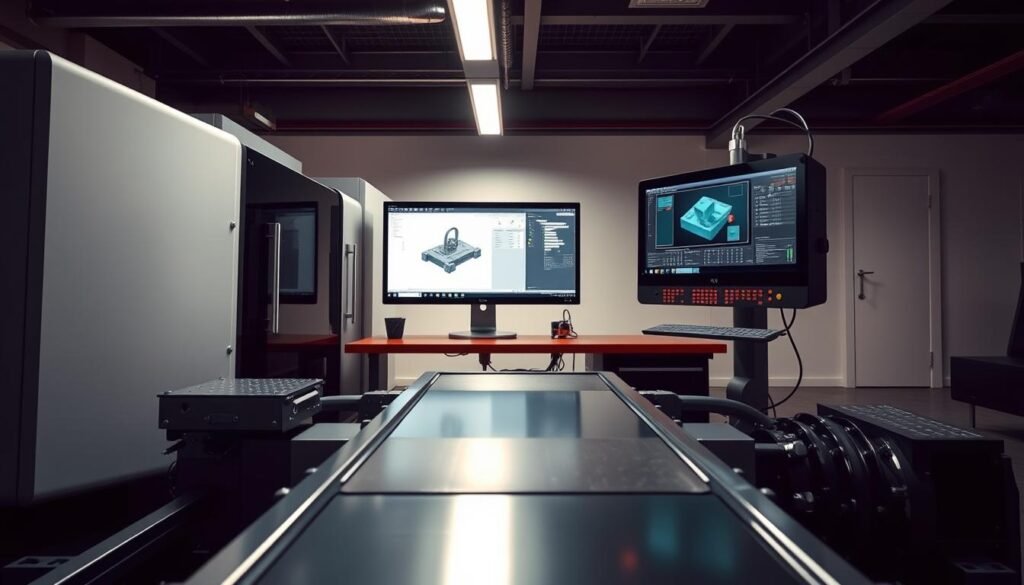
G-Code: The machine language
G-Code forms the core of CNC programming. This text-based programming language translates digital design plans into concrete machine movements. Key features of G-Code include:
- Precise positioning of the tools
- Control of movement speeds
- Setting specific processing parameters
Coordinate-based instructions
CAD/CAM software plays a crucial role in creating CNC programs. It converts complex 3D designs into coordinate-based instructions um, die von CNC machines directly executed can be.
The workflow includes several precise steps:
- Digital modeling in CAD software
- Conversion into machine-readable G-code commands
- Transmission of instructions to the CNC machine
- Exact execution of the processing steps
Through this technologically sophisticated method, CNC machines achieve unprecedented precision and reproducibility in industrial manufacturing.
Types of CNC machines
The world of CNC machine types is diverse and complex. Modern manufacturing technologies utilize various machine types to enable precise and efficient processing. Each CNC machine has unique characteristics that make it ideal for specific applications.
The main types of CNC machines differ in their core functions and processing methods:
CNC-Drehmaschinen
CNC lathes are specialists for rotationally symmetric workpieces. They enable precise machining by rotating the workpiece against a stationary tool. Typical applications include:
- Manufacture of waves
- Precise metalworking
- Complex round parts
CNC-Fräsmaschinen
CNC milling machines operate with rotating tools that remove material from a workpiece. These machine types are especially suitable for:
- Complex geometric shapes
- Precise surface treatments
- Metalworking in various materials
CNC-Router
CNC routers are particularly versatile and are frequently used in woodworking and plastics industries. Their strengths lie in:
- Engravings and carvings
- Surface processing
- Prototype creation
| Machine type | Main application | Materials |
|---|---|---|
| CNC-Drehmaschinen | Rotation parts | Metals, plastics |
| CNC-Fräsmaschinen | Complex shapes | Metals, wood, plastics |
| CNC-Router | Surface processing | Wood, plastics, soft metals |
The selection of the right CNC machine type depends on specific project requirements, materials, and desired processing details.
Advantages of CNC machining
CNC technology has revolutionized modern manufacturing and offers numerous key advantages for companies. The CNC benefits go far beyond traditional manufacturing methods and enable a drastic improvement in production efficiency.
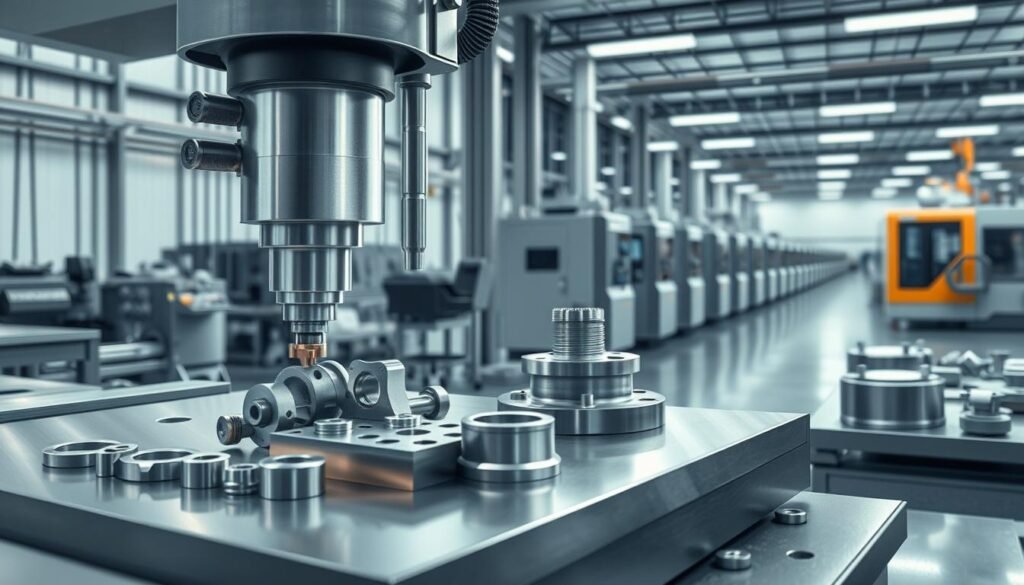
Highest precision
Manufacturing efficiency increases through the unmatched precision of CNC machines. This technology guarantees:
- Millimeter accuracy on complex workpieces
- Constant quality over thousands of production cycles
- Minimal deviations between individual workpieces
Accelerated production
CNC machines increase cost reduction through significantly faster production times. Automated manufacturing enables a:
- Increase production speed by up to 300%
- Reduction of manual work steps
- Continuous production without interruptions
Reduced material waste
The quality improvement is especially evident in the minimal rejection rate. CNC technologies reduce material waste through:
- Precise cutting and processing techniques
- Optimized program control
- Intelligent material utilization
Manufacturing complex shapes
CNC machines enable the production of workpieces with the highest geometric complexity that would be impossible with traditional methods. The limits of the possible are permanently expanding.
"CNC technology redefines the boundaries of manufacturing capabilities." – Industry Expert
Applications of CNC technology
CNC applications are revolutionizing the modern manufacturing industry through precise and innovative technologies. The industrial use of CNC machines has dramatically improved production efficiency in numerous economic sectors.
The diversity of manufacturing innovations is particularly evident in the following key industries:
Aerospace industry
In aerospace, CNC machines enable the production of highly precise components for airplanes and spacecraft. Complex parts such as turbine blades, structural elements, and precision mechanisms are manufactured with utmost accuracy.
- Manufacturing of lightweight structural components
- Precision machining of aluminum and titanium alloys
- Development of aerodynamic components
Automobile industry
Automobile manufacturers use CNC technologies for the production of engine components, body parts, and high-precision machine elements. The manufacturing innovations enable fast and consistent quality production.
- Engine block and cylinder machining
- Precise axis and transmission components
- Body design and prototype creation
Medical technology
CNC applications play a crucial role in the manufacturing of medical devices and implants. The precision enables the development of complex and customized healthcare solutions.
- Surgical Instruments
- Orthopedic implants
- Prosthetic components
Electronics industry
In the electronics industry, CNC machines support the miniaturization and complexity of modern devices through high-precision manufacturing techniques.
- Printed circuit board manufacturing
- Mikrochip-Bearbeitung
- Electronic enclosure manufacturing
Conclusion on CNC technology
The CNC technology is at the forefront of digital manufacturing and plays a crucial role in Industry 4.0. Modern manufacturing companies are increasingly relying on high-precision CNC machines to optimize complex manufacturing processes and increase productivity.
The future of CNC technology promises further technological innovations. Artificial intelligence and machine learning will make CNC systems increasingly intelligent and autonomous. Companies like Siemens and Bosch are already investing heavily in the further development of these technologies.
Digital manufacturing is being revolutionized by CNC machines. Networking, real-time monitoring, and adaptive production systems are becoming standard. Small and medium-sized businesses especially benefit from flexible and efficient manufacturing solutions that operate precisely and economically.
CNC technology remains a key element for technological advancement in industrial manufacturing. Companies that invest early in modern CNC systems secure critical competitive advantages in a rapidly changing global manufacturing landscape.
